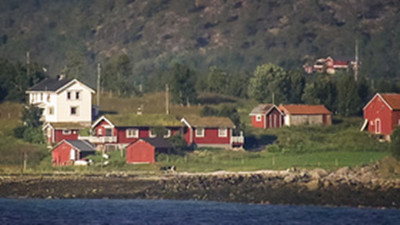They did not succeed,but remember the old Norwegian saying,it's not whether you win or lose that counts.
失敗了呀。不過大家要記得那句挪威古語云:成敗不重要,
In fact, nothing counts, and death is coming for us all.
其實,什么都不重要,因為人終有生老病死。
Exactly. So why does this stand out?
此言極是。那么這個節目出彩在哪里呢?
This is so completely different to other TV programming.
因為我們的節目跟其他的完全不同。
We take the viewer on a journey that happens right now in real time,and the viewer gets the feeling of actually being there,actually being on the train, on the boat,and knitting together with others,and the reason I think why they're doing that is because we don't edit the timeline.
觀眾宛如置身現場,仿佛真的在美景中穿梭,好像真的坐在火車上,坐在船上,或者是跟別人一起織毛衣,之所以會這么覺得,是因為我們不改編時間線。

It's important that we don't edit the timeline,and it's also important that what we make Slow TV about is something that we all can relate to, that the viewer can relate to,and that somehow has a root in our culture.
不改編時間線很重要。還有一點也非常重要,那就是我們在制作慢電視的時候,我們能把大家、把觀眾連系起來,這種聯系是深藏在我們的文化之中的。
This is a picture from last summer when we traveled the coast again for seven weeks.
這個畫面是我們去年夏天花了7個禮拜故地重游了那個海岸線。
And of course this is a lot of planning, this is a lot of logistics.
當然還需要靠強大的策劃和準備工作。
So this is the working plan for 150 people last summer,but more important is what you don't plan.
這個就是當時150名團隊成員的工作策劃表。更重要的是,我們不能只跟著計劃走,
You don't plan what's going to happen.
無法預計要發生什么,
You have to just take your cameras with you.
帶著攝像機,說走就走,
It's like a sports event.
就像體育競技一樣,
You rig them and you see what's happening.
走一步看一步。
So this is actually the whole running order for Hurtigruten, 134 hours, just written on one page.
這個是我們當時制作海達路德的全部計劃書,134個小時的節目,就一張紙。
We didn't know anything more when we left Bergen.
在開啟卑爾根之旅的時候,我們也就知道這么多。
So you have to let the viewers make the stories themselves,and I'll give you an example of that.
你需要讓你的觀眾譜寫自己的故事,舉個例子,
This is from last summer,and as a TV producer,it's a nice picture, but now you can cut to the next one.
這個是去年夏天拍攝的,通常節目制作人看到這會想,畫面不錯,但該切到下一畫面了。
But this is Slow TV,so you have to keep this picture until it really starts hurting your stomach,and then you keep it a little bit longer,and when you keep it that long,I'm sure some of you now have noticed the cow.
但在慢電視中,你必須接著拍這個畫面,直到你真的拍不下去了。不過你還是得接著拍,就在你堅持拍攝的時候,你們當中一定有人看到那頭牛了,
Some of you have seen the flag.
也有人看到那面旗子了。
Some of you start wondering, is the farmer at home?
有人一定開始想了,這農場主在家么。
Has he left? Is he watching the cow?
還是走了?你咋不看著你的牛?
And where is that cow going?
那只牛要去哪里?
So my point is, the longer you keep a picture like this,and we kept it for 10 minutes,you start making the stories in your own head.
所以我要說的是,這樣的畫面你拍得越久,我們當時拍了10分鐘,你就開始自己琢磨出一個故事來了。
That's Slow TV.
這就是慢電視的精髓。
So we think that Slow TV is one nice way of telling a TV story,and we think that we can continue doing it,not too often, once or twice a year, so we keep the feeling of an event,and we also think that the good Slow TV idea,that's the idea when people say,Oh no, you can't put that on TV.
我們覺得慢電視是一種很贊的節目故事表現方式,我們會繼續制作這類節目,不會很多,一年一兩個, 這樣我們就能保持住對一個事件的感受想法,同時,我們也覺得作為一個優秀的節目點子。它是大家嘴里那種唉呀媽呀,這個不能播。
When people smile, it might be a very good slow idea,so after all, life is best when it's a bit strange.
只要讓大家會心一笑,就有可能是個很棒的點子,因為畢竟,人生因奇葩而精彩。
Thank you.
謝謝大家。












